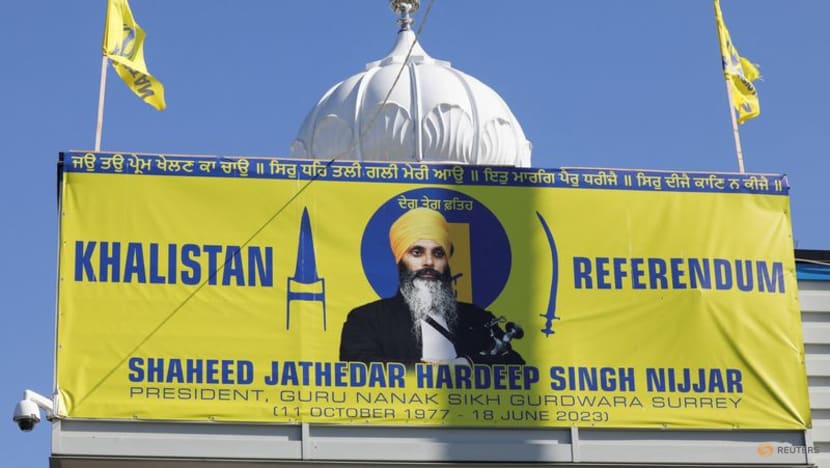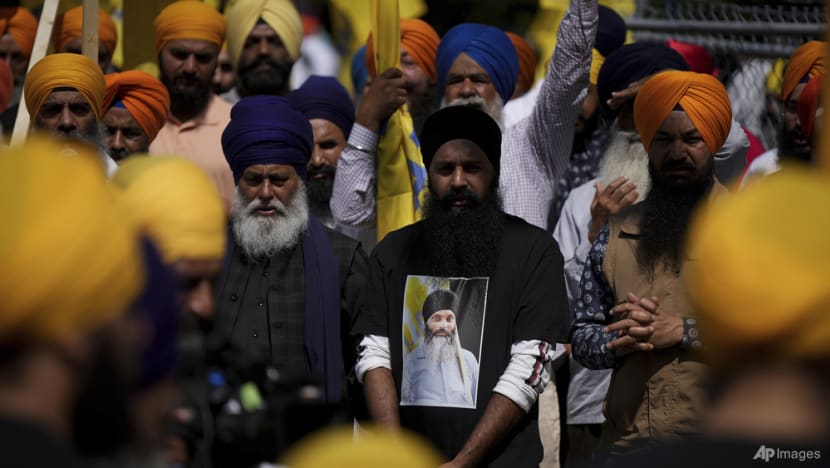What we know about the Sikh murder that soured India-Canada ties
Who was Hardeep Singh Nijjar, the Sikh leader whose death Canada alleges India is involved in? How has his murder impacted the relations between the two countries?

A sign outside the Guru Nanak Sikh Gurdwara temple is seen after the killing on its grounds in June 2023 of Sikh leader Hardeep Singh Nijjar, in Surrey, British Columbia, Canada on Sep 18, 2023. (Photo: Reuters/Chris Helgren)
SINGAPORE: India on Wednesday (Sep 20) urged its nationals in Canada, especially students, to exercise "utmost caution" as ties deteriorate after each nation expelled one of the other's diplomats in an escalating row over the murder of a Sikh separatist leader.
Tension has grown since Prime Minister Justin Trudeau said on Monday that Canada was investigating "credible allegations" about the potential involvement of Indian government agents in the murder of Hardeep Singh Nijjar, a Canadian citizen, in front of a Sikh cultural centre in a Vancouver suburb in June.
Trudeau on Tuesday also demanded that India treat with "utmost seriousness" Ottawa's allegations of New Delhi's possible involvement in the slaying of a Sikh exile.
Here’s what we know so far about the assassination that is fuelling the rift between India and Canada.

Who was Hardeep Singh Nijjar?
Nijjar was born in 1977 in Jalandhar district in India's northern state of Punjab and moved to Canada in 1997, where he worked as a plumber.
He was an activist for the Khalistan movement - which wants an independent Sikh state carved out of India.
Nijjar was wanted by Indian authorities for alleged terrorism and conspiracy to commit murder.
In 2016, Indian media reported that Nijjar was suspected of masterminding a bombing in Punjab and training terrorists in a small city southeast of Vancouver. He denied the allegations.
“This is garbage — all the allegations. I am living here 20 years, right? Look at my record. There is nothing. I am a hard worker. I own my own business in the plumbing,” Nijjar said in response to the report in a 2016 interview with the Vancouver Sun.
In 2020, Indian authorities claimed Nijjar was a member of a banned militant group and designated him a terrorist. That year, they also filed a criminal case against him as farmers, many from Punjab, camped out on the edges of New Delhi to protest controversial agriculture laws.
Last year, Indian authorities accused Nijjar of involvement in an alleged attack on a Hindu priest in India and announced a reward of about US$16,000 for information leading to his arrest.
He had denied those charges, according to the World Sikh Organization of Canada, a nonprofit organisation that says it defends the interests of Canadian Sikhs.
At the time of his death, Nijjar, who served as president of a Sikh temple or gurdwara in suburban Vancouver, was organising an unofficial referendum among the Sikh diaspora with the organisation Sikhs For Justice.
What is the Khalistan movement?
The Khalistan movement, which wants an independent Sikh state carved out of India, dates back to India and Pakistan's independence in 1947.
Then, the idea was pushed forward in negotiations preceding the partition of the Punjab region between the two new countries.
The Khalistan movement is considered a security threat by the Indian government.
The bloodiest episode in the conflict between the government and Sikh separatists occurred in 1984, when then-prime minister Indira Gandhi ordered a raid to capture armed separatists taking refuge in a major Sikh temple.
The movement's demand has resurfaced many times, most prominently during a violent insurgency in the 1970s and 1980s which paralysed Punjab for over a decade.
More recently, the Hindu nationalist-led government of Prime Minister Narendra Modi has cracked down on both non-Hindu rights movements and dissidents.
The Sikh religion was founded in Punjab in the late 15th century and currently has about 25 million followers worldwide.
Sikhs form a majority of Punjab's population but are a minority in India, comprising 2 per cent of its population of 1.4 billion.
While the Khalistan movement has little support in India, it has small pockets of backing among sections of the Sikh diaspora in Canada, which has the largest population of Sikhs outside Punjab, and in Britain, Australia and the US.
Canada has the largest population of Sikhs outside India, and India has repeatedly accused it of tolerating “terrorists and extremists.”
What do we know about Nijjar's murder?
Nijjar was shot dead outside the Sikh temple where he had served as president on Jun 18 in Surrey, a Vancouver suburb with a large Sikh population.
He suffered multiple gunshot wounds and died at the scene.
His killing marked the second prominent member of the Sikh community in Canada to be murdered in two years.
Ripudaman Singh Malik, a Sikh businessman who was acquitted in connection with the 1985 Air India bombing that killed more than 300 people, was shot dead on Jul 14 last year.
A lawyer and spokesperson for Sikhs For Justice, Gurpatwant Singh Pannun, said Nijjar had been a target of threats due to his activism.
Pannun said he had spoken to Nijjar by phone the day before his murder and that Nijjar had told him that Canadian intelligence had warned him that his life was at risk.
How has the assassination impacted India-Canada relations?
Relations between Canada and India soured following the Sikh leader's assassination and ensuing protests in Canada.
Canada said on Monday that there were "credible allegations" that agents linked to New Delhi were responsible for the murder of Nijjar.
Trudeau also said in an emergency statement to the House of Commons that any involvement of a foreign government in the killing of a Canadian citizen was "an unacceptable violation of our sovereignty".
He said he had raised the murder directly with Indian Prime Minister Narendra Modi on the sidelines of the G20 summit in New Delhi last week, and urged the government of India to "cooperate with Canada to get to the bottom of this matter".
"Canada has declared its deep concerns to the top intelligence and security officials of the Indian government. Last week at the G20 I brought them personally and directly to Prime Minister Modi in no uncertain terms," he said.
Canada also expelled India's top intelligence agent in the country on Monday, Foreign Minister Melanie Joly said, without providing details.
India on Tuesday dismissed the accusation as "absurd and motivated" and in a tit-for-tat move, said it was expelling a Canadian diplomat.
The government of Indian Prime Minister Narendra Modi also said the leader had "completely rejected" Canada's assertions in the unsolved slaying.
New Delhi also urged Canada instead to take legal action against anti-Indian elements operating from its soil.
Modi had conveyed his strong concerns to Trudeau at the G20 summit over recent demonstrations in Canada by Sikhs calling for an independent state.
The Indian government accuses Ottawa of turning a blind eye to the activities of radical Sikh nationalists who advocate the creation of an independent Sikh state to be carved out of northern India.
In a sign of the simmering crisis, Ottawa recently suspended negotiations for a free-trade agreement with India, and last week the minister of trade cancelled a trip to the country planned for October.
Trudeau on Tuesday demanded that India treat with "utmost seriousness" Canada's allegations.
"India needs to take this matter with the utmost seriousness. We are doing that, we are not looking to provoke or escalate," he said.
On Wednesday, India warned its citizens against visiting parts of Canada.
Without explicitly referring to the row, India's foreign ministry said it was concerned for the safety of its citizens in Canada because of "politically-condoned hate crimes and criminal violence".
"Threats have particularly targeted Indian diplomats and sections of the Indian community who oppose the anti-India agenda," a ministry statement said.
"Indian nationals are therefore advised to avoid travelling to regions and potential venues in Canada that have seen such incidents."
The advisory did not name specific cities or locations for Indians to avoid.
Related:
How have other countries reacted?
The White House on Wednesday said it is "deeply concerned" about Canada's allegations that Indian agents were potentially involved in the murder of a Sikh separatist leader in Canada and encourages India to cooperate in any investigation, national security spokesman John Kirby said.
US authorities had on Tuesday said that they supported Canada's investigation.
Australia's Prime Minister Anthony Albanese expressed concerns on Wednesday about the allegations raised by Canada.
Albanese told reporters that Australia does not discuss security briefings as part of the Five Eyes group, adding that he has had discussions with Canadian Prime Minister Justin Trudeau on the matter.
In New York, Australia's Foreign Minister Penny Wong on Tuesday said she had raised concerns with India, adding that Australia's Sikh community had a right to peaceful protest.
Britain is in close touch with Canada about the "serious allegations" but that will not have an impact on trade talks with India, Prime Minister Rishi Sunak's spokesperson said on Tuesday.
"Work on the trade negotiations will continue as before," the spokesperson said.
"When we have concerns about countries we are negotiating trade deals with, we will raise them directly with the government concerned. But with regards to the current negotiations with India, these are negotiations about a trade deal, and we're not looking to conflate them with other issues."

















